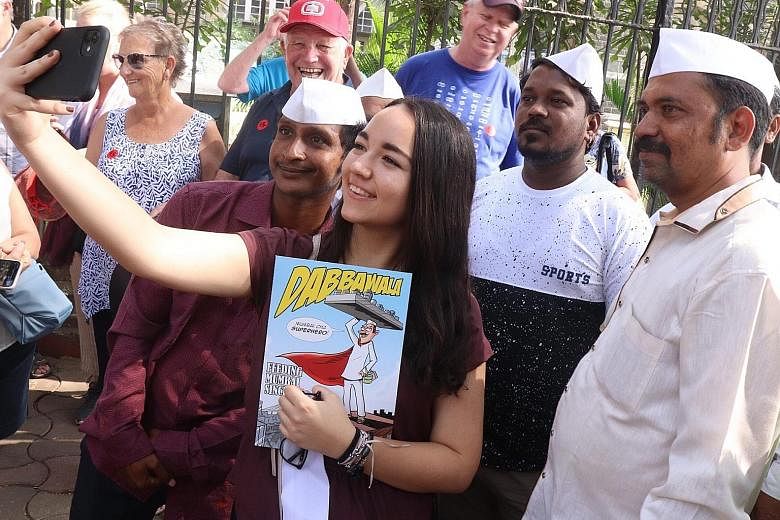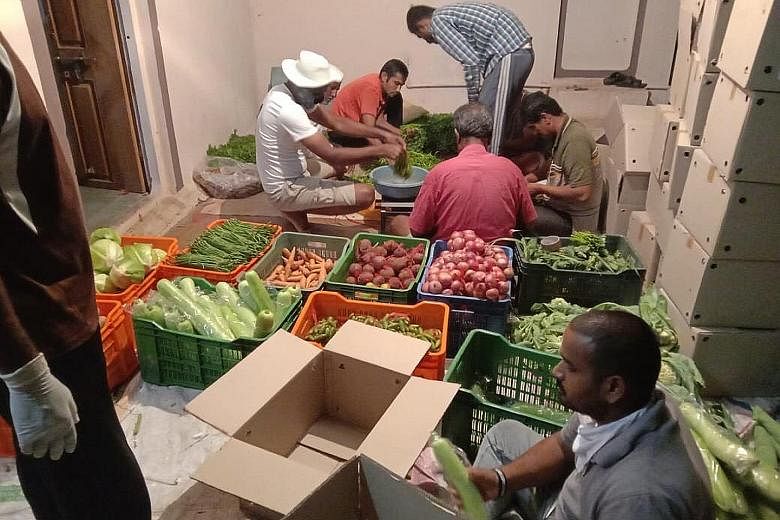Many of Mumbai's office workers and schoolchildren have had the privilege of enjoying fresh home-cooked food delivered to them daily by a faithful network of "dabbawalas". It is a practice that is more than a century old.
These workers - easily identifiable by their trademark white uniforms and white-coloured side caps, or "Gandhi caps" - are more than just a lunch box delivery system. The dabbawalas, or "ones with boxes", are a tourist attraction and a cultural icon in Mumbai, with visitors to the city queueing up to take selfies with them.
But the Covid-19 pandemic has cast a shadow over them.
Children have been studying online and most of the city's office workers have continued to work from home since March.
As a result, the bicycles of the dabbawalas rust away at Mumbai's railway stations.
"If our customers are still at home and schools shut, who do we deliver the dabbas (lunch boxes) to?" said Mr Subhash Talekar, the president of the Mumbai Dabbawala Association.
To cope with this crisis, many dabbawalas returned to their villages to farm on their ancestral land. Others have taken up different professions in the Indian city and become watchmen, rickshaw pullers or manual labourers.
The truly unlucky ones have yet to find a job, eight months since their work came to a standstill.
Mr Kailash Shinde, who has worked as a dabbawala for 22 years, has been unemployed since last April. His family has survived mostly on his wife's earnings as a domestic helper, and thanks to material assistance such as food rations that he and other dabbawalas receive from well-wishers in the city.
"I am willing to take up one that pays me even 10,000 rupees (S$181), but I have yet to find a job," said Mr Shinde, who earned about 5,000 rupees more than that every month as a dabbawala.
The pandemic's whiplash has now compelled the dabbawalas to think of survival strategies.
For the first time, last November, the dabbawalas took to ferrying something other than lunch boxes when the Mumbai Tiffin Box Suppliers Association (MTBSA) began delivering fresh produce and groceries.
"Because our customers currently do not require their dabbas, we are supplying them fruit, vegetables and groceries that they need daily at their homes instead," said Mr Vishnu Kaldoke, a spokesman for the MTBSA.
The organisation sources fresh produce from farmers' groups and sells it directly to customers in Mumbai at competitive prices.
While there were more than 5,000 dabbawalas working in the city and its suburbs before the Covid-19 outbreak, delivering 200,000 lunch boxes daily and returning them to their homes, only about 450 are now engaged in the practice. This new arrangement to sell fresh produce and grocery items has allowed another 500 to get back on the road.
MTBSA hopes this reinvention will help retain workers in the network so that they can quickly switch back to delivering lunch boxes when normal work resumes. It is also expected to cushion the dabbawalas from any threat that may arise from a post-pandemic work-from-home culture.
The origin of the dabbawalas is traced to a Parsi banker who longed for fresh, home-cooked food at his office and engaged the first such individual to bring him his meals. The idea caught on quickly, and an entrepreneurial Mahadeo Havaji Bachche tapped this opportunity to start a lunch delivery service with about 100 employees.
A system that began with simple colour coding meant to be easily understood by illiterate dabbawalas has evolved over the years to reflect its expanded coverage. Besides colour, it now incorporates numbers and letters to indicate the collection point, the train to be taken, and the final destination of the lunch box.
All this information is marked on the lid of the lunch box, which can change hands as many as six times during its daily journey and even travel more than 50km one way.
Slip-ups are rare. A 2010 study by the Harvard Business School found that dabbawalas make fewer than 3.4 mistakes per million deliveries, and accorded them a coveted "Six Sigma" rating.
The dabbawalas are now praying the pandemic recedes.
"We feel that as long as a mother's love remains for her son, a sister's love for her brother, a wife's love for her husband, as long as the family structure is retained in Mumbai, food will be cooked at home and sent out," said Mr Talekar.
And until that changes, he added, dabbawalas will remain at the service of Mumbaikars. "I am hopeful. It is hope that sustains the world."


